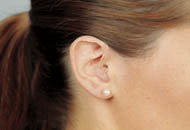By Cheryl Tanita, Au.D.,
CCC-A Chief of Audiology
People who are considering the purchase of hearing aids often have many questions—especially those who have never worn one before. Here are some of the most frequently asked questions our audiologists at Shohet Ear Associates hear when consulting with patients on improving their hearing through hearing aids.
1. What is the
most recommended hearing aid?
A: There is no one hearing aid that is right for everyone. The best hearing
aid for you depends on your type of hearing loss, lifestyle, budget and other
considerations. To find the best hearing aid for you, be sure you consult a
qualified hearing health professional who offers a broad range of hearing aid
types and styles at different budget levels.
2. Are there
any hearing aids that you can program yourself?
A. It is not recommended that you try programming your own hearing aids.
Programming requires the advanced training and familiarity of different
technologies that are part of the training of hearing health professionals.
They take into account objective measures based on your hearing tests. That is
why programming your own instrument is not recommended.
3. Which
hearing aids are considered top of the
line in terms of both engineering and form factor?
A: Every hearing aid manufacturer offers a range of products with basic,
advanced and premium features. Your best option is to find a hearing center
that carries a range of manufacturers to give you the broadest selection
possible.
4. Which
hearing aid is the most comfortable?
A. Ear canals can vary in size, so there is no one type of style that is
most comfortable. Generally, softer materials tend to be more comfortable. The
best way to determine your comfort level is to experience with the various
options in your price range.
5. Which
hearing aid is the most affordable?
A. The most affordable hearing aids will be the basic models offered by
every hearing aid vendor. You may find their features to be sufficient for your
type of hearing loss, or you may choose to invest in more advanced features
that improve the sound quality.
